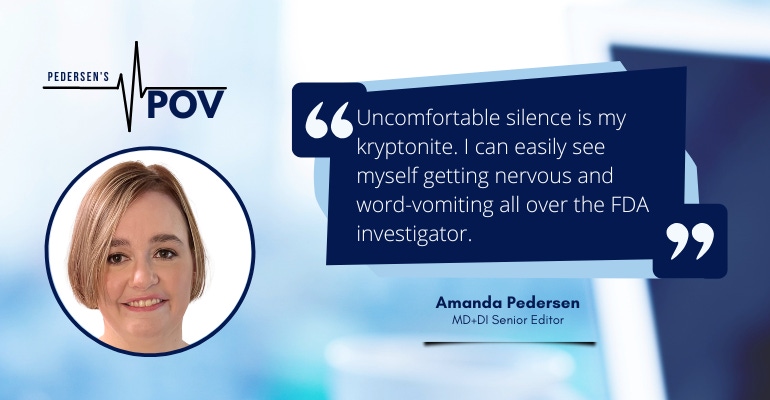Things You Should Never Say to FDA
This week in Pedersen's POV, our senior editor shares some of the craziest things FDA investigators hear during inspections.
July 31, 2023

One pearl of wisdom I often hear from regulatory and quality experts on the subject of managing FDA inspections is to answer the investigator’s questions and then zip it – do not offer more information than what is asked.
For this reason alone, I would be a terrible “front room” person during an FDA inspection. While I typically work best under pressure, uncomfortable silence is my kryptonite. I can easily see myself getting nervous and word-vomiting all over the investigator.
There’s been a rash of medical device recalls and regulatory snafus in recent weeks, so it seems like a good time for some tried and true tips for interacting with FDA.
Most of this advice comes from Steven Niedeleman’s list of 20 Things You Should Never Say to an FDA Investigator. After a distinguished 34-year career at FDA, Niedeleman is now a lead consultant for FDA and for the law firm King & Spalding. He presented the list at an FDAnews summit in 2017 and it’s been floating around the Internet ever since.
1. "You don't know what you're talking about."
It should go without saying, but never argue with the FDA investigator or insult their intelligence. It's not going to lead anywhere good. If you do happen to find yourself in a disagreement during the inspection, do your best to de-escalate the situation. Whatever you do, don't choose violence.
Troy Fugate, co-founder and vice president at Compliance Insight, recently shared a wild story from the field about an FDA inspection at a foreign site that went horribly wrong (see video below). The plant manager didn't like that the investigator was finding problems and a heated argument ensued. The plant manager became so angry that he punched the investigator in the face.
2. "During the last inspection, the FDA investigator saw the same thing and did not put it on the Form 483.”
That would be like telling a police officer that you've been pulled over before for the same violation, but you got off with a warning. Don't expect the investigator to second-guess their observation just because you got away with the same issue in the past.
3. "The last investigator was crazy." Or “The last investigator did not know what they were doing.”
Best case scenario, the investigator agrees with you, but wonders if you'll badmouth them during your next inspection. Worst case, you just insulted their favorite colleague.
4. “I told them not to do it this way...”
Don't be that person. Present a united front as a company and simply acknowledge the issue and express a willingness to address it. Don't throw your colleagues under the bus in front of FDA because you're only going to make yourself look bad.
5. "The management of this firm is only concerned with profits and does not take quality seriously."
Even if this is true, nothing good will come from sharing the company's dirty laundry with FDA. If you have legitimate concerns about your firm's quality assurance, there is surely a more appropriate time and place to bring it up than during an FDA inspection. If your concerns get brushed off, maybe consider going the whistleblower route.
6. "We don’t have enough people or time to review all those complaints…”
Manufacturers must prioritize their resources. Being a small or understaffed company is no excuse to turn a blind eye to quality complaints, especially in medtech where people's lives may be at stake. Don't waste time during an FDA inspection trying to justify poor handling of complaints.
7. "That is the way we have always done it."
If I was an FDA investigator, this sad excuse for any observation, however big or small, would make me wonder what other procedures the manufacturer has "always" done the wrong way.
8. “That’s not my fault. It was the previous person who did that…”
Don't point fingers. It's childish and annoying. The investigator doesn't care whose fault something is, they just want it fixed.
9. Don't lie to FDA ... but that doesn't mean you should have to put such a statement in writing anywhere that an FDA investigator might see it.
This one comes from an embarrassing story Susan Schniepp of Regulatory Compliance Associates shared with Medtech Insight a few years back. She had just started working as VP of a small company when FDA came knocking. The company's director of quality handled the audit while Schniepp observed. The director proudly handed the investigator the company's standard operating procedure (SOP) document on how the firm handled inspections. That seemed like a great first step until she saw the line on the SOP that read: Don't lie to the FDA.
As Schniepp said, surely the investigator wondered exactly what the firm is doing the rest of the time that it needs to remind its employees not to lie to FDA. So, she said, FDA inspections are all about perception and putting the company's best foot forward, so to speak. Don't write SOPs like you're reading them, she advised, but like someone else is going to read them.
But it wouldn't be fair to point out all the ways manufacturers have screwed up during audits without acknowledging that FDA inspectors are human too and have been known to act inappropriately and even downright creepy at inspection sites.
I'll share some examples of FDA inspector horror stories in a future Pedersen's POV, so be sure to share your wild and crazy FDA inspection stories with me at [email protected]. Please include "POV" somewhere in the subject line.
About the Author(s)
You May Also Like



